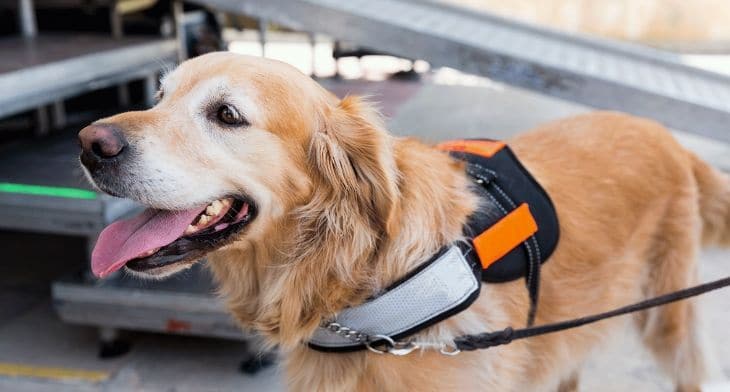Advocacy groups representing airlines and flight attendants in the US have expressed their support for the Department of Transportations proposals to amend its regulation on the transport of service animals in-flight.
The DOT has issued a Notice of Proposed Rulemaking (NPRM) on Traveling by Air with Service Animals and said it aims to address concerns regarding service animals on aircraft raised by people with disabilities, flight attendants, airports, airlines and other aviation transportation stakeholders. Proposals include defining a service animal as a dog individually trained to do work or perform tasks for the benefit of a person with a disability; and also no longer consider an emotional support animal to be a service animal.
Airlines for America welcomed the news in a statement that said the decision to limit the definition of service animal “is a positive step in protecting the legitimate right of passengers to travel with a service animal.”
“Airlines want all passengers and crew to have a safe and comfortable flying experience, and we are confident the proposed rule will go a long way in ensuring a safer and healthier experience for everyone,” said A4A President and CEO Nicholas E. Calio. “We commend Sec. Chao for her leadership providing the clarity travelers, employees and airlines need by ensuring only dogs trained to perform specific tasks for individuals with disabilities are allowed onboard aircraft.”
The association argued that the increased availability of fraudulent ESA credentials has enabled people “who are not truly in need of animal assistance to abuse the rules” also leading to an increase in incidents by untrained animals, “threatening the health and safety of passengers, crew and passengers with disabilities travelling with legitimate service animals,” the association said.
The Association of Flight Attendants – CWA also welcomed the proposed changes, with President Sara Nelson commenting: “It sets clear definitions and guidance to ensure people with disabilities and our veterans have necessary service animal assistance while maintaining the safety, health and security of all passengers and crew onboard our planes.”
In 2018, the association released a survey finding that over 98% of flight attendant respondents had worked a flight with at least one emotional support animal onboard in the prior 24 months. Of the respondents, 61% reported working a flight where an emotional support animal caused disruption in the cabin. 82% of those surveyed “strongly believe[d]” a consistent policy through the industry was needed to define requirements while supporting passengers with disabilities and veterans.
“Passengers claiming pets as emotional support animals has threatened the safety and health of passengers and crews in recent years while this practice skyrocketed,” Nelson added. “Untrained pets should never roam free in the aircraft cabin. Flight attendants have been hurt and safety has been compromised by untrained animals loose in the cabin.”
The DOT’s proposals also include allowing airlines to require forms (developed by the department) attesting to a service animal’s good behaviour and good health.
While some supported the moves, the non-profit organisation Paralyzed Veterans of America expressed concerns that the proposed rule could create “a new burden” for passengers with disabilities. PVA Associate Executive Director of Government Relations Heather Ansley commented: “We do not support treating emotional support animals like pets. Instead, we believe there needs to be a balance between enacting requirements to prevent travellers from taking advantage of access rules when flying with animals and limiting access for people with disabilities.”






